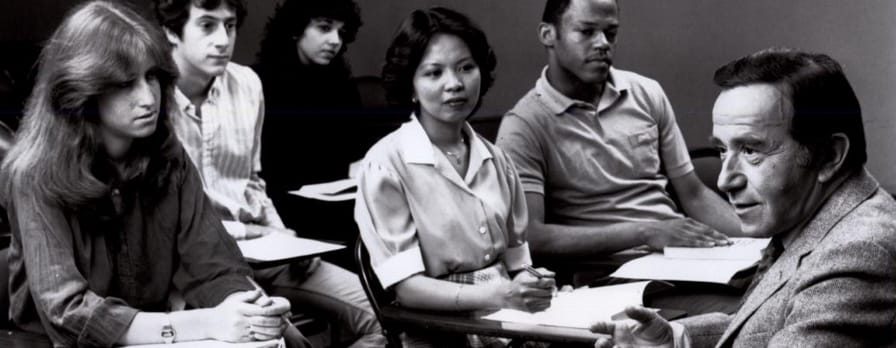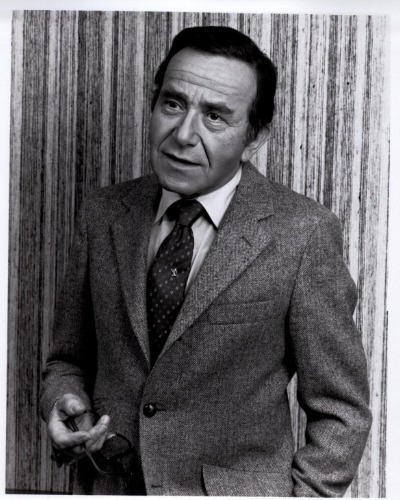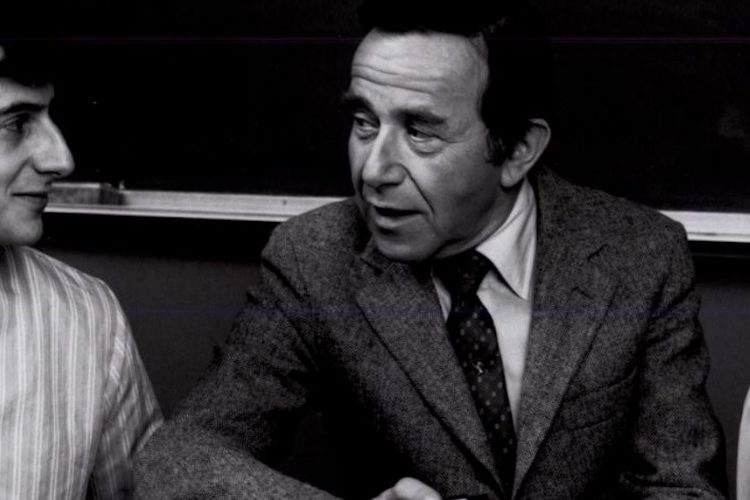In 2018, we celebrated Kaplan’s 80th anniversary. Today Kaplan is one of the world’s leading education providers, but, though it’s hard to believe, it all began in a basement in Brooklyn, New York.
Kaplan, Inc. was founded in 1938 by Stanley Kaplan, but, according to Stanley himself, the story begins even earlier. He’d inherited a love of education from his parents, who had emigrated from Eastern Europe.
Fiercely intelligent but denied a college education herself, his mother Ericka was determined that all her children would go to university. Ericka filled their basement playroom with books: encyclopaedias, as well as stories of inventors and adventurers.
At 7 years old, Stanley started a tiny lending library for neighbourhood children – complete with handmade membership cards and late fees.
By the time he was 9, he’d moved on to teaching. “Where other kids played doctor, I played teacher. If my friends complained about math fractions and percents, I would sit down with pencil and paper and explain to them how to solve the problems,” he remembered in his autobiography, Test Pilot.

A sign of things to come
The Great Depression of the 1930s brought the Kaplan family’s comfortable life to an end. The family plumbing business went bankrupt, and Stanley’s father never fully recovered from the anxiety and humiliation. But Stanley’s gifts as a teacher – and, by now, his years of experience – were beginning to be noticed.
Despite working odd jobs to help support the family financially, he’d skipped ahead 2 years at school. He was still tutoring his friends and worked as an unofficial teaching assistant in his algebra class.
The school’s employment counsellor came to him with an offer that would change the course of his life: help failing students, for 25 cents an hour. Stanley was thrilled. He was just 14.
“There was no greater thrill than watching a student’s face at that moment of revelation when he finally grasped an idea. Witnessing that was like hitting a home run.” — Stanley Kaplan
Share this quote
And yet teaching wasn’t the career Stanley was planning. He was going to medical school.
While many second-generation immigrants might have felt pushed towards medicine by their family, all the pressure Stanley felt came from himself – his parents would have preferred him to pursue his passion for teaching.
But Stanley wanted to stabilise his finances and regain the social standing his family had lost during the Depression. Medicine seemed like the surest way.
But, to Stanley’s surprise, he was turned down by every medical school he applied to. He couldn’t understand it – he knew he had the brains, and after skipping several grades at school, he’d graduated from City College aged just 18. Finally, he came to a depressing conclusion: he was rejected because he was Jewish, and because he’d attended a public school.
Stanley never forgot this discrimination. But, in 1938, now aged 19, he committed himself to teaching, down in the basement where as a child he’d started a library. He put a sign outside his parents’ house: “Stanley H Kaplan Educational Center.”
“To say you can’t improve scores is to say you can’t improve students, and I disagree with that.” — Stanley Kaplan
Share this quote
Kaplan grows
In 1946, a student called Elizabeth asked Stanley for help with a new test designed for college admissions: the SAT. But he was confused by the test too. The instructions advised students that studying was pointless – the SAT would measure their innate intelligence rather than their knowledge.
But the very idea of not studying for a test made no sense to Stanley, and he didn’t believe academic ability was set in stone; he knew it was possible for thinking and problem-solving skills to improve.
Stanley made Elizabeth practise mathematical and reading comprehension exercises again and again – helping her not only to strengthen her analytical ability, but improve her confidence. When they were finished, Elizabeth passed the SAT exam with ease.

“People were coming from all over the country to study in little old Brooklyn” — Stanley Kaplan
Share this quote
Word spread that Stanley Kaplan could help you get into college, and students eager to achieve their ambitions flocked to the tiny basement tutoring company. Of course, Stanley was pleased to have the business – but his success meant more than that.
As he saw it, he was helping to level the playing field, giving students who could never have afforded to attend an expensive private school a chance to compete.
Within a few years, the basement was overflowing with students and books. Stanley opened his first fully-equipped school in 1951, and a second in 1957. By the 1960s Kaplan, Inc. had 17 centres, coaching students not just for the SAT but for a whole range of potentially life-changing qualifications, such as the GMAT, MCAT and GRE.
Acceptance into the world of education
In 1983 the College Board invited Stanley to speak at its annual convention. After more than 46 years of feeling like an outsider, Stanley was accepted by the educational establishment. It was overwhelming.
Even after Stanley sold Kaplan, Inc. to the Washington Post company in 1984, he continued to work and teach for the company that bore his name. He retired in 1994 at the age of 75, after devoting an incredible 56 years to education.
In fact, just as the story of Stanley’s passion for teaching began well before he founded Kaplan, it continued even after he left it. With his wife Rita, he created the Rita J. and Stanley H. Kaplan Family Foundation, dedicated to healthcare, the arts, and of course, education.
Stanley died in 2009, at the age of 90, leaving an extraordinary legacy – millions of people across the world whose dreams of a better life he’d helped to come true. Today, Kaplan strives to continue his work of opening up access to education, and transforming lives for the better.
“I dedicated my life to meeting the needs of students in ways that traditional forms of education could not, and Kaplan continues in that tradition today.” — Stanley Kaplan
Share this quote




